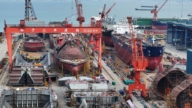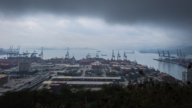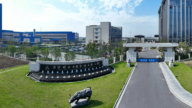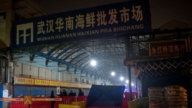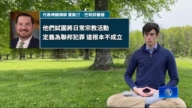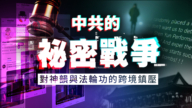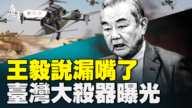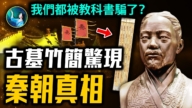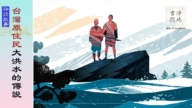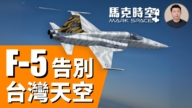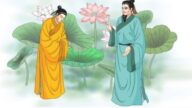【新唐人2014年12月20日讯】近期,中国大陆民间融资风险集中爆发。随着各地民间借贷和投资担保公司频频倒闭,这个“始于全民放贷高息狂欢,崩于借款企业资金链断裂,终至‘全民讨债’”的一幕,正在各地上演。除了暗中流淌的百亿资金,更多的是债权人的无尽担忧和悔恨的泪水。
今年7月份,四川省最大的民营融资担保公司之一——汇通信用融资担保公司的高管“失联”,涉及民间融资超过30亿元。汇通担保事件后,四川民间金融市场依旧余震不断,各类理财和居间公司资金链断裂案件频发,老板跑路、失联,甚至被抓,成了民间借贷圈的常态。
据大陆媒体报导,今年8月,成都民企龙头怡和集团负债超过40亿元,其中牵涉民间高利贷16亿元;9月,理财公司联成鑫和四川财富联盟违约,涉及金额都在2亿元左右﹔10月初,P2P平台铂利亚无法提现,涉及金额7000多万元。
另外,《中国茉莉花革命》网站报导,四川鑫众伟业投资管理有限公司在12月宣称,项目方资金链断裂,无法支付本息,涉及金额也超过7000万元。
18号,该网站还刊登了四川鑫众全体债权人的求救信,指责四川当局推卸责任、封锁消息,不向受害人通报案情,导致老百姓讨债无门、维权无门,陷入极大的茫然和惶恐中。
《新唐人》特约经济评论专家杰森‧马认为,中共当局对民间融资基本上是采取“懒政”的不作为手法,从而导致民间借贷乱象丛生。
杰森·马:“它(中共)知道如果强硬的把这条路砍死的话,可能很多中小企业一下就垮掉了。当然另一方面它也知道这些企业的还债能力是风险很大的,它就把自己摆脱出来,就是说‘一个愿打一个愿挨’,那你就去搞吧,反正我也不管。”
《中国茉莉花革命》网站还披露,河南嘉信投资担保有限公司以高息回报集资8个亿,却突然停止所有业务,并拒绝归还本金给客户,还声称省政府和公安局有人撑腰。数百名受害者在12月17号到省政府门口示威,抗议官商勾结的诈骗行为。
几乎同一时间,河南富通资产管理有限公司破产,数亿本金不能兑付。约200名投资受害人讨债示威,却被警察驱散,多人被抓捕。
北京国情内参首席研究员、中国金融智库研究员巩胜利:“中国的这种个人担保公司,它的风险大还有一个问题,我一直在强调的政治资源。比如某一个市长,某一个县长或某一个副市长是个贪官,贪官被抓了以后,他留下的黑洞没有人能填的上来。”
有业内人士估计,80%的民间借贷资金都流向了房地产行业。
海外财经分析人士古春秋也向媒体指出,中国的经济秩序混乱,担保公司背后一般是房地产公司,而房地产公司的背后可能是当地政府,这是官商勾结的基本套路。
在河北邯郸市,金世纪、万聚、卓峰等当地主要私营房地产企业在今年先后违约,甚至人去楼空。仅金世纪一家的民间融资规模,就接近30亿元,涉及的投资人约有5000人。
美国《纽约时报》通过其中一名受害人王女士得知,中共当局已经将曾经前往邯郸市政府“上访”,寻求帮助的大批受害者,视为重点维稳对像并严密监控,投资人组成的QQ群中也有当局的卧底。
王女士还说,自己每晚都在做噩梦,不敢想自己最终会损失多少。现在为了照顾生病的母亲,没有工作,没有任何的收入来源。她表示,“如果拿不回钱,就只能自杀。”
杰森‧马:“如果这个政府是对老百姓负责,它应该出台相应的法律监管借贷的双方。同时有这样的案例出来的话,应该有统一的报导使老百姓充份理解这个事情的风险。但是中国不管从哪个角度,维稳、维持整个社会的经济发展秩序各方面,它采用了政府不管,媒体不报。”
《纽时》引述西南财经大学经济与管理研究院院长甘犁的研究数据称,中国民间借贷的规模已经超过8万亿,而且普遍存在信息不对称,借贷成本高,融资平台门槛低、风控能力弱的特征,因此存在很大风险。
《福布斯中文网》上的一篇评论文章也提醒,智者始而愚者终,5年前的放贷者可能是最精明的商人,而现在的放贷者可能成为庞氏骗局最后一棒的接棒者。
采访/易如、陈汉 编辑/李明飞 后制/萧宇
Army Newspaper: Tiger Behind Zhou Yongkang will be Hunted Down
After the downfall of Xu Caihou and other former military “tigers",
the CCP’s “tiger hunting" spread to all military academies,
Xi Jinping’s faction has taken more intensive action against
Jiang Zemin’s faction.
Recently, the CCP army newspaper published a
commentary article, believed to be a strong sign
of the clash between the two factions.
On 17 Dec, the CCP “People’s Liberation Army Daily"
published a commentary article titled
“Anti-corruption is a battle of life and death and can not
be lost".
The article analyzed and refuted two points of view,
“Anti-corruption will lose people’s support" and
“Can anti-corruption be continued".
It claimed that “It should end here" is just an illusion,
“have a tiger by the tail” is a misjudgment.
The article uses many harsh phrases such as “will not be
tolerated" and “eliminate all evilness" to respond to
the doubts of “whether anti-corruption can be continued".
It also highlighted, “Even big ‘tigers’ such as Zhou Yongkang,
and Xu Caihou have been hunted down, nobody will be spared."
It makes the outside world really wonder who the
army newspaper is referring to.
Some people believe that it may be Xi Jinping’s biggest
rival in the faction clash, Jiang Zemin.
Affairs commentator, Xia Xiaoqiang: “After the Fourth
Plenary Session, Xi Jinping accelerated the crackdown on
the Jiang faction."
“Especially after the announcement of the arrest of Xu Caihou
and Zhou Yongkang, the army newspaper
continuously published articles, with Xu Caihou upgraded from
“traitor" to “national demon".
“Army newspaper’s tone has been rising, even the
‘big tigers’ are hunted down, who else can be spared?"
“This sends a clear message, both Xu Caihou and Zhou
Yongkang are ‘big tigers’, and they are supported by
Jiang Zemin, such an argument points directly to Jiang."
Another speculation is that the article is alluding to another
General of the Jiang faction, Guo Boxiong,
who is a former vice chairman of Central Military Commission.
Overseas media observed that the credible Weixin account of
“Political Observer" had reports on Guo Boxiong.
The “Phoenix Weekly" recently had a report that revealed
the inside story of Gu Junshan’s corruption, it indirectly
mentioned that Guo Boxiong may be involved.
So it is natural for the outside world to relate the article
in the “People’s Liberation Army Daily" to Guo Bixong.
In addition, the article also pointed out “the confrontation
of corruption and anti-corruption was at stalemate",
it has reached a critical time and juncture that determines
success or failure.
Deepening anti-corruption will inevitably encounter
various obstructions and rebounds.
However, the article highlighted “there is no turning back",
and this is a “desperate battle".
In this regard, analysts believe that this article conveys the
attitude of Xi Jinping, categorically denying the possibility of
compromise in this power struggle.
Xia Xiaoqiang: “The army newspaper uses such clear and
strong words now, it releases two messages."
“One is Xi Jinping has encountered resistance from Jiang
faction after the downfall of Zhou Yongkang and Xu Caihou,
hence the article stated ‘we can not back down or lose
in this desperate battle’."
“The other is, Xi Jinping has sent a signal of the final decisive
showdown to the Jiang faction, via the army newspaper articles,
he also uses the military to warn and deter Jiang Zemin.
Since the CCP 18th National Congress, Xi Jinping took a series
of actions in national defense and military construction,
and quickly gained control of the military.
Then began the large scale “anti-corruption" operation.
Therefore, it is believed that the military is the backup force
of Xi Jinping’s “anti-corruption" and “tiger hunting", as well as
an important force in eliminating the Jiang faction.
Some analysts believe, the army newspaper voice for
Xi Jinping with such a clear stand, proves Xi’s control over
the military is quite secure.
Xia Xiaoqiang: “After Jiang Zemin obtained supreme
power in the CCP after the June Fourth Incident,
he began to ‘turn left’, and changed Deng Xiaoping’s
Chinese economic reform policy."
“On Jan. 1992, Deng Xiaoping began his southern tour, and
warned Jiang Zemin ‘people who stop reform would
be stepped down’."
“As Deng controlled the actual military power, the military
newspaper immediately issued the editorial
‘escorting Chinese economic reform’, and Jiang Zemin
immediately changed his attitude."
Insiders have revealed to the media, that the military
is the key to whether anti-corruption can continue.
So, “tiger hunting" in the military became the most important
fight in the desperate battle between Xi and Jiang factions.
In Nov. this year, during Xi Jinping’s state visit to Australia,
New Zealand and Fiji, it is reported that at least
eight generals in the CCP military were arrested.
Subsequently, it is reported that Major General Song Yuwen,
deputy political commissar of Jilin Military, and
Mafa Xiang, deputy political commissar of the Navy,
committed suicide.
Recently, the “anti-corruption" operation has spread to all
military academies.
After the Vice President of Nanjing Institute of Politics,
Dai Weimin was taken in for questioning,
the newly appointed director of the political department,
Colonel Ma Xiangdong shared the same fate in early Dec.
Earlier, Major General Gao Xiaoyan, the Political Commissar
and Discipline Inspection Secretary of the PLA Information
Engineering University had also been taken in for questioning.
She became the first female general to be investigated after
the 18th National Congress.
Those actions were regarded as the proof that
Xi Jinping is eliminating the last remnants of Jiang Zemin
in the military."
Interview/yiru Edit/zhangtianyu Post-Production/xiaoyu




